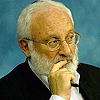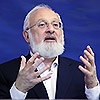Audio Version Of The Blog – 5/25/22
Listen to an Audio Version of the Blog
Download:MP3 Audio

Listen to an Audio Version of the Blog
Download:MP3 Audio

Michael Laitman, On The Times of Israel: “Globalization: The Good, the Bad, and the People of Israel”
Much has been said about globalization. On the one hand, it gave everyone access to amenities that until a few decades ago only the rich could have. It opened us to new cultures and places, and improved the material life of most everyone around the world. On the other hand, globalization has devastated local production in countless countries and inflicted destitution on millions of people whose jobs have moved to other countries. Yet, alongside these heavy problems, there is another process that globalization has set in motion: the fusing of humanity. Globalization has made us similar, created a common basis for cooperation and understanding, nurtured shared desires and aspirations, and opened the door for understanding among all people.
The fact that now, after decades of accelerated globalization, we can understand each other’s words and gestures means that we can begin to understand each other’s hearts all over the world. Until now, there has never been a situation where all of humanity shared the same problems and aspirations, and could communicate freely among all nations in order to join hands, solve the problems, and realize the aspirations.
Curiously, the process that humanity is undergoing today is the same process that the Israeli nation went through when the nation first formed. The first Israelites were strangers from different, often rival tribes and lands. Yet, as they all elevated the ideal of unity above all else, they managed to unite above their different origins and form a new nation.
Now, humanity is inadvertently being driven to undergo the same process. We may not want to understand one another, but we do, since the global circumstances have become similar around the world, and the problems are similar and affect all other places. We may come from Finland or from India, from the US or China, Japan or Latin America, but our aspirations are the same, our technology is the same, and our upbringing is more or less the same. Like it or not, we are becoming one, global nation.
This is why at such a time, Israel is getting so much attention, predominantly for condemnation. We are the only group of people who has ever dealt with such a situation, and we have found a way to overcome suspicion and alienation and merge into a nation. We formed a society that, for significant periods of time, managed to become the “chosen nation,” a model society where people love their neighbor as themselves. At such times, non-Jews from around the world would come to Jerusalem to witness Jewish unity, especially during the festivals when Jews gathered in Jerusalem in a pilgrimage that brought together the entire nation.
Eventually, we succumbed to suspicion and alienation like the rest of the world, but humanity has not relieved us from our duty to set an example. It keeps stating that we are responsible for all the problems in the world, effectively saying that it is within our power to correct them. Jews relate to it as antisemitism but in fact, it is humanity’s demand that we fulfill our calling, our commitment to the world.
Now that we are scattered and dispersed throughout the world, we, Jews, are “globalized,” as well. Nevertheless, the root of our ancient union lives within us and projects itself wherever we go. It accelerates the process of unification and globalization even though we cannot feel that our ancient root is still alive within us.
When Israel become aware of who they are and what they are meant to bring to the world, the anger toward them will subside and the world will join them in establishing a global village whose diverse cultures and ethnicities are united by love. Humanity will not suppress the differences between nations and cultures; on the contrary, it will welcome them and thrive because of them, as everyone will contribute their exclusive traits to the common good.
When that happens, the world will realize Israel’s secret: Success does not come from one dominant doctrine or perception, but from opposing and conflicting views that join together under a canopy of brotherly love, where everyone uses their various qualities and perceptions for the common good.
[298141]
Medium published my new article “The Train of Evolution’s Next Stop”

Let’s imagine, for just a few minutes, that we are on a special train, the train of human evolution. The train approaches its next stop and stops at the dock. As we step off the train, we see a sign that reads “Welcome to the Connected World.”
At first, nothing seems different; everything looks like the world we know. But as we venture into the new world, we start bumping into things, and the collisions are getting more and more painful. As it turns out, the connected world may look similar to ours, but it is governed by completely different laws.
The world is changing very quickly. The forces operating on us are forcing us to move to another level of awareness. It is demanding that we begin to understand nature’s governing laws, to look at the world we live in from a higher perspective, more expansively and globally than our narrow vision.
For thousands of years, civilization has been developing with an individualistic mindset. Each of us was driven by self-centered impulses that kept on growing. But now these impulses have brought us to a standstill.
Today’s young people feel lost, disoriented, uncertain about what to do with their lives and what they want from life. They feel like misfits in the world we have built according to our own makeup, while they are different.
For thousands of years, the ego was king. We worked, did business, and made money. Now we are suddenly locked in a global network with countless elements that we cannot control and do not understand.
Every movement someone makes somewhere affects all of humanity. The butterfly effect has turned from a theory into our everyday reality. In such an integrated world, where everything is interconnected and interdependent, we have no choice but to take each other’s needs into account. Gradually, through bumping into more and more obstacles, we realize that unless we think of everyone, no one will succeed.
The problem is that we are not designed to do that. We do not think in a considerate way, and we do not feel that genuine caring is even possible.
This will be humanity’s next great challenge: the transition to a new attitude toward all people. We will have to start by not doing to others what we would not like done to us, until we finally come to a state where we actually love one another, as fantastic as it may sound today.
This evolutionary change will happen regardless of our will. It is already underway. The only question is whether we will adjust to it without more blows that will make us painfully aware that we are all in the same boat.
Now is the time to open our eyes and learn to feel connected. Now is the time to teach ourselves a new thought paradigm — one that includes others, since everyone’s benefit is also my own.
[298050]

Michael Laitman, On The Times of Israel: “Tlaib is winning because we are fighting the wrong war”
Last week, Rashida Tlaib, accompanied by her fellow “squad” members and several other progressive members of Congress, introduced the first-ever congressional resolution that would see the US formally recognize the Palestinian “Nakba,” or “catastrophe,” which is how they refer to the establishment of the State of Israel. By all indications, the proposal will not pass. Nevertheless, it is another chunk off the thinning wall that protects Israel. It will not be long before Congress joins the growing choir of voices calling Israel an apartheid state and voting to revoke it.
But it is not for their wit that they are winning, but for our folly. We are fighting the wrong war. If we fought for our own cohesion rather than against their divisive rhetoric, we would have no problems with anyone.
Instead of fighting against the forces that seek to weaken us, we should fight for the thing that gives us strength—solidarity. Currently, we are wasting our time, resources, and energy in every direction on pointless apologetics that convince no one, not even ourselves. We are trying to explain that we have a right to live in the land of Israel, but when even we have no idea why we are here, can we complain that others don’t, as well?
Every nation takes pride in what makes it unique, in its legacy and traditions. We have abandoned our culture, abandoned our legacy, and adopted cultures and traditions of other nations. Why then are we surprised that they despise us and regard our existence as redundant and undesirable?
Instead of clinging to our own legacy and offering it to the world, just as every other nation does, we have built a patchwork culture that combines the legacies of other nations, but nothing that belongs to the unique gift we were meant to bring to the world. In such a state, we really don’t deserve our land, the land of Israel.
Our legacy is the achievement of our ancestors to form a nation out of complete strangers. Although they were often hostile toward each other, they nevertheless insisted on unity at all costs. King Solomon defined it as love that covers all crimes (Prov. 10:12), and The Book of Zohar (Aharei Mot) says that by carrying it out, we bring peace to the world.
In the previous century, Rav Kook wrote in his book Orot HaKodesh, “Since we were ruined by unfounded hatred, and the world was ruined with us, we will be rebuilt by unfounded love, and the world will be rebuilt with us.” When the great 20th century kabbalist and thinker Baal HaSulam talks about “national pride,” he means the pride to be the trailblazers of unity above all differences.
When acclaimed historian Paul Johnson wrote in his comprehensive composition A History of the Jews, “At a very early stage in their collective existence the Jews believed they had detected a divine scheme for the human race, of which their own society was to be a pilot,” he meant that the Israeli society was to be a “startup nation” in achieving solidarity where it did not seem achievable.
The more divided the world becomes, the more the Jewish pilot society is needed, and the more the world resents us for not building it. It is no wonder that the most rabid antisemites also admired the Jews and sought their example. Henry Ford, in his venomous compilation The International Jew—the World’s Foremost Problem, also inserted statements that show what he expected from us: “Modern reformers, who are constructing model social systems … would do well to look into the social system under which the early Jews were organized.”
In fact, even the Nazis initially supported the fledgling Jewish state. It was for their own reasons, of course, and they later retracted their support and sided with the Arabs, but when they first came to power, they fully supported the Zionists’ efforts to build a Jewish state in the land of Israel.
If the November 29, 1947 League of Nations vote to establish a Jewish state took place today, no one would vote in favor. In fact, no one would even propose it. We have no one to blame for it but ourselves. Rashida Tlaib and her cohort are only a reminder of what we are refusing to do: restore our legacy of unity above all differences and divisions, and become the pilot society that the world expects from us.
[298095]
 In the News (Hundredth Monkey Effect and Information Cascade): “The hundredth monkey effect is a hypothetical phenomenon in which a new behavior or idea is said to spread rapidly by unexplained means from one group to all related groups once a critical number of members of one group exhibit the new behavior or acknowledge the new idea. This concept is closely related to the information cascade model we learnt in class and demonstrates how it works in the animal world.
In the News (Hundredth Monkey Effect and Information Cascade): “The hundredth monkey effect is a hypothetical phenomenon in which a new behavior or idea is said to spread rapidly by unexplained means from one group to all related groups once a critical number of members of one group exhibit the new behavior or acknowledge the new idea. This concept is closely related to the information cascade model we learnt in class and demonstrates how it works in the animal world.
“The story of the hundredth monkey effect was published in … 1975. Some scientists were conducting a study of macaque monkeys on the Japanese island of Kōjima in 1952. These scientists observed that some of these monkeys learned to wash sweet potatoes in the water, and once a critical number of these monkeys was reached, i.e., the hundredth monkey, this previously learned practice instantly spread across the water to other troupes of monkeys on nearby islands without any contact between the troupes. This phenomenon correlates to the information cascade model in that it shows how ideas can spread quickly once they hit a certain level of acceptance. The certain level of acceptance matches with the tipping point in advertising we discussed in class.”
The researchers also observed the following pattern which suggests the information cascade process based on network structure:
My Response: Yes, they say that on the neighboring island, the monkeys began to do the same. This is a normal transmission of thoughts at a distance.
In our daily life, we often encounter such facts. For example, in a newspaper, stories are printed with certain headlines. Over twelve hundred miles, at the same time, the exact same story comes out in another newspaper, although there really was no connection. Absolutely the same thing. Nobody stole anything. It is just that people are in the same field and spread all their thoughts in it.
It is the same with monkeys and in general with all nature at any level. We just need to take this relationship into account and understand that we, like monkeys, are interconnected. Let’s think carefully, then everyone will have good thoughts.
I should not criticize anyone, but first of all, think well myself, and then I will actually see how the world is getting better.
Thinking well does not mean selfishly, just to make everyone feel good. What does it mean to “love your neighbor as yourself”? Imagine that the others are your loved ones. There is no way to go anywhere if the world is global. Let’s hope this helps.
Comment: As a result of the experiment with monkeys, scientists came to the conclusion that a critical mass of people is needed who would be looking for an answer to the question posed, and then this will happen.
My Response: In Kabbalah, this is called 600,000 souls. This is a conditional name. Indeed, a critical mass is needed.
[296696]
From KabTV’s “Close-Up. The Philadelphia Experiment” 10/24/10
Related Material:
Our Collective Consciousness Influences The World
Can We Measure The Effect Of Thoughts?
Mysticism Or Lack Of Senses?
 Question: Is everything around a person, including the massive flow of information, not unnecessary, but is created in order for a person to filter it?
Question: Is everything around a person, including the massive flow of information, not unnecessary, but is created in order for a person to filter it?
Answer: Yes, today it is impossible otherwise. With the current flow of information, we need to initially, clearly, adjust ourselves to the fact that I am interested in this as the main thing in my life, and a little more of this as an accompanying one.
Of course, there is the life of the world, the planet, the universe, and humanity; I need to learn something from this, too, and every day I do it according to some schedule. But mainly, I am interested in what I do, where I can perceive, absorb, and give something.
Question: From the point of view of Kabbalah, there are no unnecessary things in the world. Could it be that what a person filters out now, he will be able to use in the future?
Answer: No, he will sort it all out, and only the most necessary things will remain. Man is not created to absorb all the garbage that we create.
[297847]
From KabTV’s “Kabbalah Express” 4/29/22
Related Material:
Breaking The Information Impasse
Social Networks As A Place To Express Emotions
The Way To Ultimate Communication
 Question: What are the ten Sefirot?
Question: What are the ten Sefirot?
Answer: When creation begins to interact with the Creator and the relationships between them are getting filled with meaning, strength, and intention, then they are called Sefirot.
If a person attains the attitude of the Creator to him and reacts to it correctly, these ten degrees turn into the ten Sefirot. “Sefira” is from the word “luminous.”
A person begins to feel how the Creator treats him and how he should treat the Creator. In other words, there is some kind of a system that exists in potential, and when we attain it, we bring our feelings into it and this is called Sefira. Then the entire system begins, sparkles, glows, as it were.
[297800]
From KabTV’s “Spiritual States” 5/10/22
Related Material:
What Are The Sefirot?
Me And My First Nine Sefirot
The Spiritual Body In The Form Of Sefirot
 All of nature is built on unity, mutual participation, mutual balance, and mutual support. Therefore, each participant in this inner closed picture of nature takes from it as much as he can and should take for his existence, and no more.
All of nature is built on unity, mutual participation, mutual balance, and mutual support. Therefore, each participant in this inner closed picture of nature takes from it as much as he can and should take for his existence, and no more.
But man takes from nature without considering absolutely anything! And he not just takes. He robs it, destroys all other species without caring about giving them the opportunity to recover. We have developed within ourselves such a consumeristic attitude toward nature that there can be no question of any kind of balance.
In addition, man brings a huge imbalance into it with his thoughts, because they are the greatest forces in nature.
Thought is a great power. We see from the example of nature that the more powerful the force, the more imperceptible it is, as if more hidden like nuclear forces, subatomic forces, radiation forces, and radio waves. And we do not feel the spiritual world at all.
That is, rough mechanical forces operate at a short distance are here next to us. And the more powerful the force is, the more subtle and the less it is captured by us.
Therefore, Kabbalah speaks of the fact that the most powerful forces are the forces of our mind, our thoughts, and our relationships with each other. Even though it seems to us: “What difference does it make how I think about the world or how I treat others?!”
But in fact, these are also forces of nature and the most powerful in their impact because they are of the highest quality. They are not at the level of inanimate, vegetative, and animal nature, but at the level of human nature, and therefore, they bring in the greatest imbalance.
Thus, with our bad attitude toward each other, we simply destroy ourselves and our world. Therefore, both in the Bible and in humanity in general, we are given a humane basis: “Love your neighbor as yourself.” Everyone agrees with this principle; however, no one fulfills it. If we followed this formula, then, of course, we would come to a completely different civilization.
[297597]
From KabTV’s “Close-Up. Europe Today” 1/26/11
Related Material:
Delicate Balance of Nature
Who Disrupts the Balance of Nature?
Natural Disasters And The Role Of Humanity
 Question: From where do thoughts of receiving arise in us?
Question: From where do thoughts of receiving arise in us?
Answer: The main thought of the universe, meaning, the Creator, the thought, created us opposite to Himself so that we could attain Him from this state and cloth in Him with our opposite qualities.
Question: It turns out that all our thoughts, our whole world, is the reverse side of the Creator, right?
Answer: That is exactly right. That is why our world is called “creation,” from the word “create,” that is, to create something opposite, external from oneself.
The thought we call the Creator is completely altruistic. We are absolutely egoistic. We are created by this thought as a desire to receive, and not like Him to give. But thanks to this very difference, we are something distinct from Him, exist independently, and are able to know Him from the outside, superimposed on Him.
Therefore, we come to such a state that we and He exist, and we can achieve equivalence of form with Him, while remaining opposite to Him by nature.
We cannot change our nature. Our thought remains egoistic, but we learn how to use it with the correct intention from this thought, from the Creator.
[297413]
From KabTV’s “Close-Up. Secrets of Immortality” 1/7/11
Related Material:
Finding Your Place in the Thought of Creation
Two Sides Of The Thought Of Creation
Is Thought Tangible?
 Comment: According to economists, the impending crisis was anticipated by a number of American investment bankers, but they did not take any measures that could mitigate its consequences. Moreover, some of them openly tried to use the upcoming problems for their personal interests.
Comment: According to economists, the impending crisis was anticipated by a number of American investment bankers, but they did not take any measures that could mitigate its consequences. Moreover, some of them openly tried to use the upcoming problems for their personal interests.
My Response: Of course! We cannot demand any other actions from people. Anyone in the world that sees that some kind of trouble or catastrophe is coming, but at the same time that some benefit can be drawn from it, will try to draw it. This is a natural impulse of our nature.
Therefore, you can’t blame them for this! And you can’t demand anything else from them. The smallest or biggest person in their place would have done the same. It’s just that people are envious that some were able to do something and the others were not.
We need to think about something else: “Where did the crisis come from? What can we do? What will happen in the future? Did it pass or not?” These are all absolutely open questions.
Naturally we are in a crisis. Gradually, it will nevertheless manifest itself despite the fact that we are trying to smooth it out in some way. But that’s not possible. Unemployment will rise and despite printing money and selling gold reserves, nothing will change.
Humanity will still find itself in a huge global crisis. This is not some kind of isolated crisis, but a universal one, a total crisis. It captures absolutely all manifestations of human society and all our activities.
Question: In some European countries, it is possible to receive unemployment benefits and not work, and then the country does not know what to do with these people because they get used to it and of course no longer want to work. Who is to blame here?
Answer: Of course, giving a person some benefits for free means educating them incorrectly. This is not how we should act in our society.
From the point of view of Kabbalah, this is a wrong approach to humanity, the world, and society. Each of us must have a balance between receiving and giving.
Such politics of governments regarding the reception of immigrants will bring these countries closer to the crisis even faster. But they can’t do it any other way! That’s the way society works.
[297644]
From KabTV’s “Close-Up. Europe Today” 1/26/11
Related Material:
Scholarship Instead Of Welfare For Unemployment, Part 1
An Unconditional Basic Income
Compulsory Studies For All